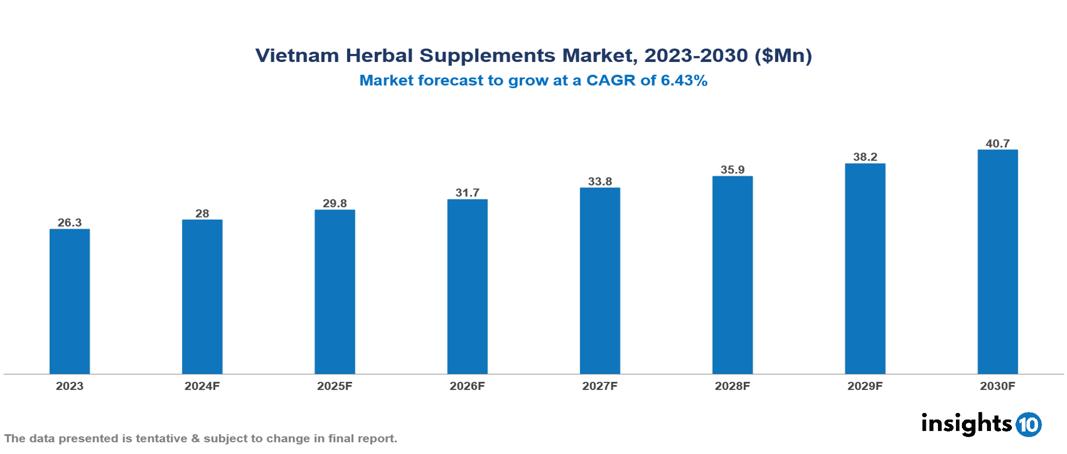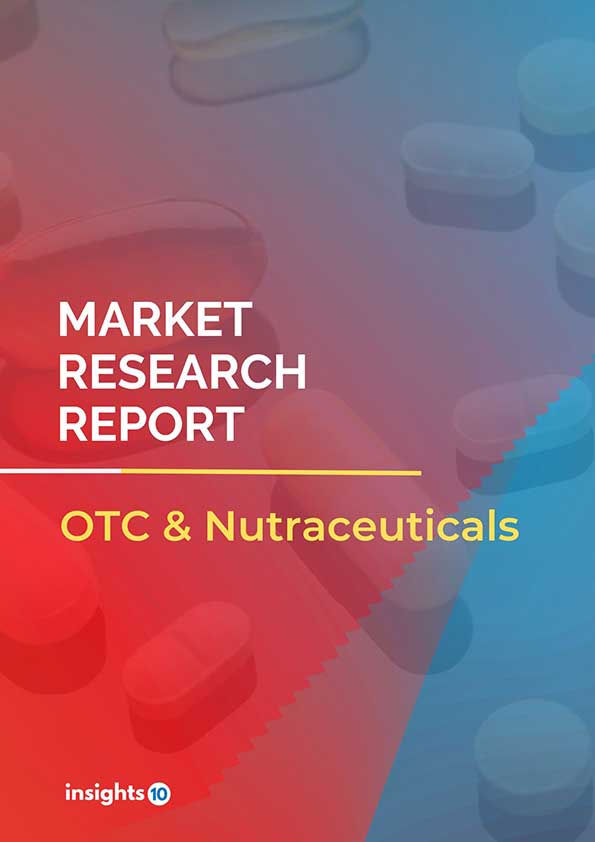Vietnam Herbal Supplements Market Report
The Vietnam Herbal Supplements Market was valued at $26.30 Mn in 2023 and is predicted to grow at a CAGR of 6.43% from 2023 to 2030, to $40.68 Mn by 2030. The key drivers of this industry include increased awareness, rising disposable income, and expansion of distribution channels. The industry is primarily dominated by players such as Himalaya, Herbalife Nutrition, Patanjali Ayurved, and Sao Thai Duong Company among others.
Buy Now

Vietnam Herbal Supplements Market Executive Summary
The Vietnam Herbal Supplements Market was valued at $26.30 Mn in 2023 and is predicted to grow at a CAGR of 6.43% from 2023 to 2030, to $40.68 Mn by 2030.
Herbal supplements are plant-based products used to treat diseases or maintain health. These supplements, which include herbal, botanical, or phytomedicines, are derived from plants or composed of one or more herbs. They are intended for internal use and are commonly found in solid forms such as capsules, pills, tablets, and lozenges, as well as in liquid or powder forms. However, herbal supplements can interact with prescription medications and may cause side effects like allergic reactions, nausea, and headaches. Popular herbal supplements include turmeric, ashwagandha, ginseng, echinacea, and valerian root.
In 2021, herbal, traditional, and therapeutic supplement products constituted more than 70% of Vietnam's health supplement market. Self-medication using over-the-counter herbal remedies is prevalent in Vietnam, particularly in rural regions, where it encompasses between 40% to 60% of the population. The market is driven by significant factors like increased awareness, rising disposable income, and expansion of distribution channels. However, safety and efficacy concerns, competition from substandard drugs, and lack of coverage restrict the growth and potential of the market.
Prominent players in this field include Himalaya, Herbalife Nutrition, Patanjali Ayurved, and Sao Thai Duong Company among others.

Market Dynamics
Market Growth Drivers
Increased Awareness: The increasing awareness among Vietnam's expanding middle-class and affluent population about health risks and preventative measures is driving greater demand for herbal products. This demographic's heightened health consciousness is a significant market driver for the herbal supplement industry in Vietnam, as it encourages more consumers to seek out natural and herbal alternatives to support their overall well-being and prevent health issues.
Rising Disposable Income: The projected growth in disposable income among Vietnam's middle class, coupled with an anticipated increase in households earning more than $5,000 annually by 2027, serves as a key market driver for the herbal supplement industry in Vietnam. This economic advancement is expected to enable more consumers to afford and prioritize spending on health and wellness products, including herbal supplements, thereby boosting market demand significantly.
Expansion of Distribution Channels: The expansion of online platforms and distribution networks makes herbal supplements more accessible across urban and rural areas, driving market growth by reaching a broader consumer base.
Market Restraints
Safety and Efficacy Concerns: Consumer skepticism or concerns regarding the safety and efficacy of herbal supplements relative to conventional medicines serve as a market restraint for the herbal supplement industry in Vietnam. These uncertainties can hinder widespread adoption and reduce demand among consumers who prioritize proven efficacy and safety in their healthcare choices.
Competition from Substandard Products: Local and international companies in Vietnam face competition from cheaper, substandard, and illegal products, which undermine efforts to ensure quality and safety in the herbal supplement market, potentially eroding consumer trust and market viability.
Lack of Coverage: Reimbursement programs in Vietnam typically do not include herbal supplements, requiring customers to pay out-of-pocket. This acts as a market restraint for the herbal supplement industry by limiting affordability and potentially reducing consumer demand compared to reimbursed medical treatments.
Regulatory Landscape and Reimbursement Scenario
Herbal supplements in Vietnam fall under the regulation of the Ministry of Health (MOH) and related authorities. Derived from plants and natural sources, these products, categorized as health supplements, must be registered with the Vietnam Food Administration (VFA) under the MOH. Unlike conventional medical treatments, dietary supplements, including herbal supplements, are generally not covered by national health insurance or reimbursement programs. Therefore, customers typically need to purchase these products themselves. While uncommon, some private health insurance plans may cover specific categories of dietary supplements.
Competitive Landscape
Key Players
Here are some of the major key players in the Vietnam Herbal Supplement Market:
- Himalaya
- Herbalife Nutrition
- Patanjali Ayurved
- Sao Thai Duong Company
- Amway
- Trafaco
- Korea Ginseng Corporation
- IMC
- NOW Foods
- Hishimo Pharmaceuticals Pvt. Ltd.
1. Executive Summary
1.1 Product Overview
1.2 Global Scenario
1.3 Country Overview
1.4 Healthcare Scenario in Country
1.5 Government Regulation in Country
1.6 Recent Developments in the Country
2. Market Size and Forecasting
2.1 Epidemiology of Disease
2.2 Market Size (With Excel and Methodology)
2.3 Market Segmentation (Check all Segments in Segmentation Section)
3. Market Dynamics
3.1 Market Drivers
3.2 Market Restraints
4. Competitive Landscape
4.1 Major Market Share
4.2 Key Company Profile (Check all Companies in the Summary Section)
4.2.1 Company
4.2.1.1 Overview
4.2.1.2 Product Applications and Services
4.2.1.3 Recent Developments
4.2.1.4 Partnerships Ecosystem
4.2.1.5 Financials (Based on Availability)
5. Reimbursement Scenario
5.1 Reimbursement Regulation
6. Methodology and Scope
Vietnam Herbal Supplements Market Segmentation
By Product Form
- Tablet
- Capsule
- Powder
- Others
By Application
- Immunity
- General Wellness
- Specific Health Condition
By Distribution Channel
- Pharmacies
- Supermarket/Hypermarket
- Online
- Specialty Stores
Methodology for Database Creation
Our database offers a comprehensive list of healthcare centers, meticulously curated to provide detailed information on a wide range of specialties and services. It includes top-tier hospitals, clinics, and diagnostic facilities across 30 countries and 24 specialties, ensuring users can find the healthcare services they need.
Additionally, we provide a comprehensive list of Key Opinion Leaders (KOLs) based on your requirements. Our curated list captures various crucial aspects of the KOLs, offering more than just general information. Whether you're looking to boost brand awareness, drive engagement, or launch a new product, our extensive list of KOLs ensures you have the right experts by your side. Covering 30 countries and 36 specialties, our database guarantees access to the best KOLs in the healthcare industry, supporting strategic decisions and enhancing your initiatives.
How Do We Get It?
Our database is created and maintained through a combination of secondary and primary research methodologies.
1. Secondary Research
With many years of experience in the healthcare field, we have our own rich proprietary data from various past projects. This historical data serves as the foundation for our database. Our continuous process of gathering data involves:
- Analyzing historical proprietary data collected from multiple projects.
- Regularly updating our existing data sets with new findings and trends.
- Ensuring data consistency and accuracy through rigorous validation processes.
With extensive experience in the field, we have developed a proprietary GenAI-based technology that is uniquely tailored to our organization. This advanced technology enables us to scan a wide array of relevant information sources across the internet. Our data-gathering process includes:
- Searching through academic conferences, published research, citations, and social media platforms
- Collecting and compiling diverse data to build a comprehensive and detailed database
- Continuously updating our database with new information to ensure its relevance and accuracy
2. Primary Research
To complement and validate our secondary data, we engage in primary research through local tie-ups and partnerships. This process involves:
- Collaborating with local healthcare providers, hospitals, and clinics to gather real-time data.
- Conducting surveys, interviews, and field studies to collect fresh data directly from the source.
- Continuously refreshing our database to ensure that the information remains current and reliable.
- Validating secondary data through cross-referencing with primary data to ensure accuracy and relevance.
Combining Secondary and Primary Research
By integrating both secondary and primary research methodologies, we ensure that our database is comprehensive, accurate, and up-to-date. The combined process involves:
- Merging historical data from secondary research with real-time data from primary research.
- Conducting thorough data validation and cleansing to remove inconsistencies and errors.
- Organizing data into a structured format that is easily accessible and usable for various applications.
- Continuously monitoring and updating the database to reflect the latest developments and trends in the healthcare field.
Through this meticulous process, we create a final database tailored to each region and domain within the healthcare industry. This approach ensures that our clients receive reliable and relevant data, empowering them to make informed decisions and drive innovation in their respective fields.
To request a free sample copy of this report, please complete the form below.
We value your inquiry and offer free customization with every report to fulfil your exact research needs.








































